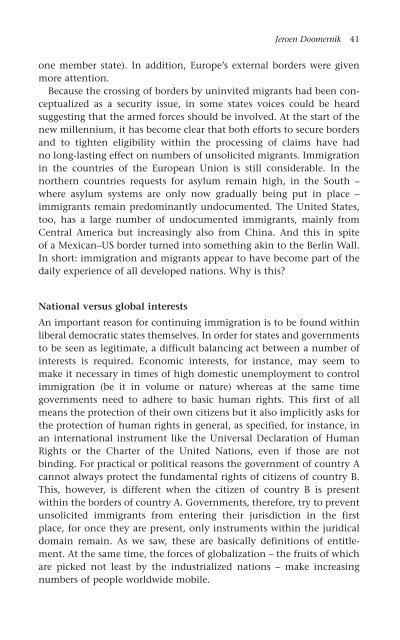3071-The political economy of new slavery
3071-The political economy of new slavery
3071-The political economy of new slavery
You also want an ePaper? Increase the reach of your titles
YUMPU automatically turns print PDFs into web optimized ePapers that Google loves.
Jeroen Doomernik 41<br />
one member state). In addition, Europe’s external borders were given<br />
more attention.<br />
Because the crossing <strong>of</strong> borders by uninvited migrants had been conceptualized<br />
as a security issue, in some states voices could be heard<br />
suggesting that the armed forces should be involved. At the start <strong>of</strong> the<br />
<strong>new</strong> millennium, it has become clear that both efforts to secure borders<br />
and to tighten eligibility within the processing <strong>of</strong> claims have had<br />
no long-lasting effect on numbers <strong>of</strong> unsolicited migrants. Immigration<br />
in the countries <strong>of</strong> the European Union is still considerable. In the<br />
northern countries requests for asylum remain high, in the South –<br />
where asylum systems are only now gradually being put in place –<br />
immigrants remain predominantly undocumented. <strong>The</strong> United States,<br />
too, has a large number <strong>of</strong> undocumented immigrants, mainly from<br />
Central America but increasingly also from China. And this in spite<br />
<strong>of</strong> a Mexican–US border turned into something akin to the Berlin Wall.<br />
In short: immigration and migrants appear to have become part <strong>of</strong> the<br />
daily experience <strong>of</strong> all developed nations. Why is this?<br />
National versus global interests<br />
An important reason for continuing immigration is to be found within<br />
liberal democratic states themselves. In order for states and governments<br />
to be seen as legitimate, a difficult balancing act between a number <strong>of</strong><br />
interests is required. Economic interests, for instance, may seem to<br />
make it necessary in times <strong>of</strong> high domestic unemployment to control<br />
immigration (be it in volume or nature) whereas at the same time<br />
governments need to adhere to basic human rights. This first <strong>of</strong> all<br />
means the protection <strong>of</strong> their own citizens but it also implicitly asks for<br />
the protection <strong>of</strong> human rights in general, as specified, for instance, in<br />
an international instrument like the Universal Declaration <strong>of</strong> Human<br />
Rights or the Charter <strong>of</strong> the United Nations, even if those are not<br />
binding. For practical or <strong>political</strong> reasons the government <strong>of</strong> country A<br />
cannot always protect the fundamental rights <strong>of</strong> citizens <strong>of</strong> country B.<br />
This, however, is different when the citizen <strong>of</strong> country B is present<br />
within the borders <strong>of</strong> country A. Governments, therefore, try to prevent<br />
unsolicited immigrants from entering their jurisdiction in the first<br />
place, for once they are present, only instruments within the juridical<br />
domain remain. As we saw, these are basically definitions <strong>of</strong> entitlement.<br />
At the same time, the forces <strong>of</strong> globalization – the fruits <strong>of</strong> which<br />
are picked not least by the industrialized nations – make increasing<br />
numbers <strong>of</strong> people worldwide mobile.


